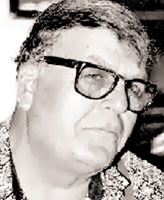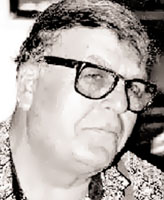
Faces & TracesKanafani, Ghassan F.(The Founder of the Modern Palestinian Novel) [Archives:2008/1196/Culture]
September 6 2008
 |
[email protected]
Faces & Traces is a cultural series of concise biographies of local or international famous and obscure personalities in fields such as literature, arts, culture and religion in which these individuals contribute affirmatively. It is a short journey in contemporary history, attempting to tackle numerous effective characters in human civilization.
Kanafani, Ghassan Fayiz, Palestinian journalist, novelist, short-story writer, playwright, researcher, and contortionist. He was born in 1936, in Acre (Akko), city in Palestine, near Haifa. Kanafani joined Al-Firair School in Jaffa in which he studied the French language. During the 1948 Arab-Israeli War, Kanafani and his family fled to Lebanon but soon moved on to Damascus, Syria, to live there as Palestinian refugees. In Damascus, Kanafani worked as a clerk of petitions and in the same time pursued his study in the School of National Scientific College. In the early 1950, Kanafani joined Public Secondary School in Damascus and after 2 years he received a teaching certificate from the United Nations Relief and Works Agency. He then worked as a teacher in the refugees' schools and especially the Palestine's Institute in Damascus. In 1952, he enrolled in the Department of Arabic Literature at the University of Damascus and in the next year he joined the Arab Nationalists Movement (ANM), a pan-Arab organization led by George Habash. Consequently, Kanafani was expelled from the university in 1955 as a result of his political involvement. He moved to Kuwait in the late 1955 and worked as a teacher in Al-Ma'arif Al-Kuwaitia Schools. In Kuwait, Kanafani became more politically active and started editing the newspaper “Al-Ra'i” (The Opinion) and writing political essays under the pen name Abu Al-Ezz.
Kanafani relocated once again to Beirut in 1960 where he was conceded the Lebanese nationality and began editing the newspaper “Al-Hurria” (The Liberty), the mouthpiece of the ANM. He took up the editing of the newspaper “Al-Muharrir” (The Liberator) in 1962 and issued a newspaper's supplement entitled “Palestine.” In 1967, Kanafani become an editor of the Nasserist newspaper “Al-Anwar” (The Illuminations) and in the same year he became the spokesman of the Popular Front for the Liberation of Palestine (PFLP). He also edited the PFLP's newspaper “Al-Hadaf” (The Target), which he had founded later in 1969.
Kanafani is considered a major modernizing influence on both Arab and Palestinian literatures. During his relatively short life, Kanafani had published 18 books and written hundreds of articles on culture, politics, and Palestinian people's struggle. Many of his literary works have been translated into 17 languages -including Hebrew language- and published in more than 20 different countries. His first and most important novel was entitled “Rijal Fee Al-Shams” (Men in the Sun, 1964) which tackled the cause of immigration for Palestinians during the first years of occupation. In 1973, “Men in the Sun” was made into a motion picture entitled “Al-Makhdo'aoon” (The Deceived) which was selected as one of the 100 most important political movies in the history of the international cinema. Kanafani's next novel was entitled “Returning to Haifa” (1969) which described the displacement's journey of Palestinians after the 1948 calamity. “All That's Left to You” (1966) was the second part of Kanafani's first novel “Men in the Sun” in which he propagated the fedayees' visions in struggling and resisting the occupation. Among his other complete novels “Umm Sa'ad” (1969) and other incomplete novels “The Lover”, “The Dead Red Lotus”, and “The Apricots of April.”
His short-story collection entitled “The Land of the Sad Oranges” (1963) chronicled also the struggle of the displaced Palestinians. Other stories depicted different situations of a Palestinian character include “The Forbidden Weapon” and “A Murdered in Al-Musil.” Kanafani's short-story collection entitled “On Men and Rifles” (1968) embodied the three essential things that a Palestinian still has which are the land, the time, and confronting the enemy. Among his other short-story collections “Death of Bed Number 12” (1961) and “A World that is not ours” (1970).
Kanafani was the first one who wrote about the resistance poets and published their pomes. His book entitled “Poets of the Occupied Territories” became a reference and was included in the curriculum of several universities. His study entitled “On Zionist Literature” (1967) introduced boldly the Zionistic literature to the Arab intellects. His study entitled “The Revolution of 1936-1939 in Palestine: Backgrounds, Details, and Analysis” discussed Kanafani's thoughts about the dramatic and radical transformations in the Palestinian cause. Among his other studies the one entitled “The Palestinian Resistant Literature under the Occupation” (1968). His dramatic works include dramas such as “The Door” (1964), “The Hat and the Prophet” (1967), and “A Bridge to Eternity” (1978).
He wrote many stories in which children are the heroes. A collection of his short stories for children was entitled “Ghassan Kanafani's Children” published posthumously in 1978. As a contortionist, Kanafani left several magnificent oils belonged to the period of his stay in Kuwait before he gave up and turned into journalism and politics.
Kanafani was awarded the prize of the book's friends in 1966 in Lebanon. His name got the International Organization for Journalists' Award in 1974 and the Lotus Award in 1975 awarded by the Union of the Authors of Asia and Africa. His name also was awarded the Order of Jerusalem for Culture and Arts in 1990.
Kanafani was blown up in a car explosion planned by Mossad, Israel's intelligence agency, on July 8, 1972, in Beirut, Lebanon. Kanafani wanted to be close from the masses and because he wrote about their cause, he exploited his pen to weave tales of naive and poor people in his homeland. Kanafani stated in one of his novels that: “The greatest crime anybody can commit is to think that the weakness and mistakes of others give him the right to exist at their own expense.”
——
[archive-e:1196-v:16-y:2008-d:2008-09-06-p:culture]


